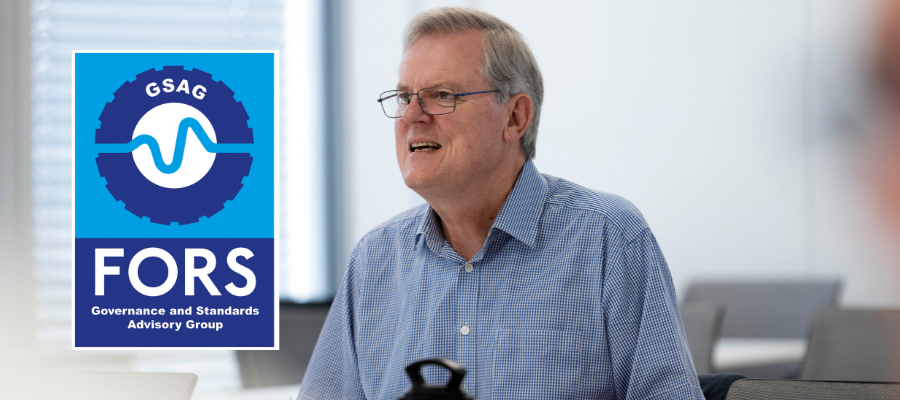🕒 Article read time: 2 minutes
GSAG: lifting the lid on FORS’ advisory group
Content sponsored by FORS

Steve Agg (pictured above), chair of the Governance and Standards Advisory Group (GSAG), explains the group’s pivotal role in ensuring that FORS remains the UK’s leading fleet accreditation scheme.
The Governance and Standards Advisory Group, or GSAG as it is more commonly known, exists to be a credible and technically competent industry representative body that performs a core role in developing the FORS Standard. GSAG is the ultimate body overseeing the scheme’s governance and is a key element in maintaining the integrity and relevance of FORS on behalf of fleet operators, specifiers and the public we serve.
SUGGESTING CONTINUOUS IMPROVEMENTS
Part of GSAG’s role is to recommend changes, improvements and additions to the FORS scheme where appropriate, and to provide guidance to ensure that the FORS Standard is subject to continuous improvement, remains relevant to industry needs and is compatible with all relevant legislation. Finally, members of GSAG help to promote the development and growth of FORS to suppliers, customers, colleagues and stakeholders.
A DIVERSE RANGE OF TALENTS
The GSAG membership is made up of FORS accredited operators, specifiers, trade associations, and industry-relevant public and professional bodies. We strive to build a diverse membership of stakeholders who are supportive of the scheme’s aim to improve all aspects of fleet operations for the benefit of society at large.
JOINING THE GROUP
Organisations that are interested in joining GSAG are required to write to enquiries@fors-governance.org.uk and give an explanation as to why they’d like to join. The process from there is managed by Steer Group, the FORS Governance and Standards service provider. Steer has responsibility for managing various working groups, including GSAG and FORS Executive Group. For more information, visit the FORS website.
BUILDING A POSITIVE PROFILE
When I engaged with FORS and with GSAG I wanted to help generate a more positive profile for the logistics profession – both in terms of the businesses and the people working within it. FORS offers a publicly visible means for fleet operators and transport specifiers to show that they care passionately about our environment and the safety and efficiency of all that they do.
FORS has become an established mark of quality, recognised within the industry and beyond, and as such remains an essential component in enabling users of transport to select the very best fleet operators.
ALTERNATIVE SCHEMES
Many readers will no doubt be aware of the recent news that Transport for London has granted ‘equivalency’ to alternative schemes. I understand the rationale because competition is essential to any business in driving innovation and combatting the complacency that monopoly can breed.
What I disagree with, however, is the catch-all term 'equivalency' being used in respect of schemes that are only truly ‘equivalent’ to FORS in specific areas – in this case as they pertain to compliance with TfL’s Work Related Road Risk initiative. To me, this causes confusion in the marketplace and doesn’t serve the overall aim of raising standards in fleet operations.
TRUE EQUIVALENT SCHEMES WELCOMED
Truly equivalent competitor schemes are welcome, as any initiative to improve standards should be, but only FORS offers the comprehensive operational standard that fleet operators and specifiers have demanded since 2008. There is no doubt in my mind that FORS remains unparalleled for those operators who want to clearly demonstrate that they hold themselves to the most rigorous standard across a broad range of operational areas.
*https://www.fors-online.org.uk/cms/governance
Published On: 02/03/2023 16:00:02

Comments Section
If you are a Logistics UK member login to add comments.